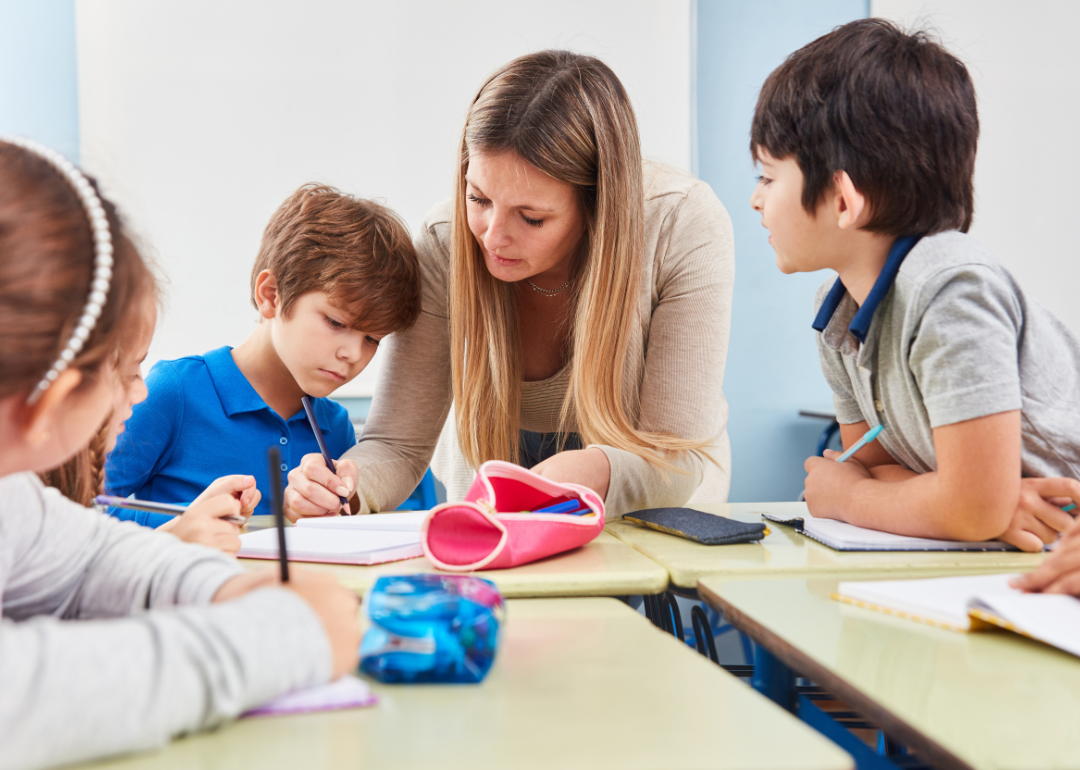What is high-dosage tutoring?

Canva
What is high-dosage tutoring?
A tutor working with two students.
High-dosage, or high-impact, tutoring is a growing, evidence-based practice that can help schools shrink learning gaps and accelerate learning through intensive, personalized student support. For that reason, HeyTutor used various news and academic sources to explore and explain high-dosage tutoring.
The concept of tutoring is not new, but the push for high-dosage tutoring is. Just last year, the Biden administration endeavored to provide students with an additional 250,000 tutors and mentors over the next three years through the National Partnership for Student Success.
To understand what high-dosage tutoring is, it is helpful to understand what this type of intervention is not. High-dosage tutoring differs from after-school homework assistance, parental help, and once-a-week private tutoring. Tutoring programs are considered “high-dosage” when students receive at least three sessions a week from teachers or other specifically trained providers in groups of four or fewer, with each session lasting at least 30 minutes. About 1 in 10 public school students in the United States participate in high-dosage tutoring, according to federal data collected in June 2022.
States are putting millions toward tutoring efforts to recover lost academic progress from school closures and combat school labor shortages caused by the COVID-19 pandemic. While data shows this type of support can be highly effective in the right setting, schools nationwide have experienced mixed results. There are also cost and implementation barriers.
Training in-house tutors or outsourcing are both expensive options, and high-dosage tutoring can cost schools $4,000 or more per student per school year. Additionally, tutoring provided by online for-profit companies may market certain services as high-dosage when, in reality, they do not meet the federal definition of the practice.
![]()

Canva
High-dosage tutoring is a method of providing tutoring frequently in a small setting to accelerate student learning
A teacher tutoring a group of four students.
Research shows that small-group learning has important academic, social, and psychological benefits. Students learn and retain more information than they generally do in larger settings and engage with the content and their peers more effectively. A report from the Annenberg Institute for School Reform at Brown University discovered that not only is tutoring a cost-effective mode of educational intervention but, over time, gains of three to as many as 15 months of learning across all grades can be achieved.

Canva
High-dosage tutoring could help close learning gaps incurred during the height of the pandemic
A tutor high-fiving a student during a session with two kids.
High-dosage tutoring has been found to be particularly effective for accelerating math and reading gains—two subjects in which COVID-19 erased 20 years of academic progress. Research from the Regional Educational Laboratory Northeast and Islands found that tutoring led to an additional 10 months of learning in high school math and roughly five months in elementary school reading. However, students most likely to benefit from high-dosage tutoring are the least likely to have adequate access if schools do not facilitate it, especially if it is only offered online.

Canva
Quality data on high-dosage tutoring as a systematic intervention is lacking
A tutor working with a group of four kindergarten students on identifying shapes.
Researchers from the Regional Educational Laboratory Northeast and Islands program evaluating the impact of high-dosage tutoring caution that, despite promising data, many open questions remain about how these services can be implemented at scale nationwide.
Some studies on high-dosage tutoring, including the REL’s, are still in efficacy trials, meaning the conditions are close to ideal and may not reflect the reality of implementation in a given district. Trade-offs in evaluating efficacy data will be required to account for varying contexts between districts. Additionally, 10% nationwide participation in high-dosage tutoring among public school students is a small and inconsistent sample size. Some students opt for online tutoring sessions, while others meet with school-based tutors one-on-one.

Canva
Tennessee has invested heavily in high-dosage tutoring projects
A teacher teaching a student who has a book open on their desk.
The need for effective academic interventions in the wake of pandemic learning loss is pressing in Tennessee. In 2021, roughly 4% more students scored below proficiency on state standardized tests compared with 2019. Tennessee invested $200 million to combat this loss in the Tennessee Accelerating Literacy and Learning Corps program, which allowed school districts to access federal American Rescue Plan funding early and start high-dosage tutoring efforts.
One-off benchmark assessments of the TN ALL Corps program show promise. At one participating elementary school, students experienced an average of 14% growth during their first three months in the program, compared with 6% growth for students not participating in the tutoring, according to the district.

Canva
Private companies are also investing in tutoring projects
A teacher tutoring a group of four elementary-aged students.
Venture capital funding for education technology is expected to increase in 2023 after a pandemic-driven dip. In 2022, tutoring alone garnered hundreds of millions in venture capital funding. As more for-profit companies fill the gap between the need for tutors and the number of qualified professionals, it will be critical for school administrators and families to understand which companies provide high-dosage tutoring versus something vaguely similar, like on-demand support.
Tutoring services commonly offered 24/7 via online platforms, while potentially helpful for some students, often do not meet the rigorous requirements or characteristics to qualify as high-dosage tutoring.
This story originally appeared on HeyTutor and was produced and
distributed in partnership with Stacker Studio.